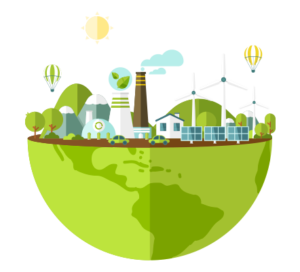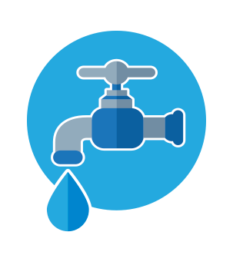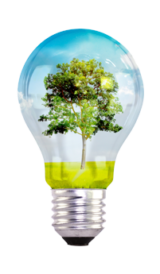I. Renewables
As Saudi Arabia embarks on the unprecedented journey to grow its renewables sector from scratch, exciting opportunities await investors. The government has launched a set of reforms and actions to enhance credibility, transparency and assurance to the  private sector. In addition, the Electricity and Cogeneration Regulatory Authority (ECRA) has been established as an independent regulator to ensure adherence to international standards and to guarantee the provision of safe, reliable and efficient electric power.
private sector. In addition, the Electricity and Cogeneration Regulatory Authority (ECRA) has been established as an independent regulator to ensure adherence to international standards and to guarantee the provision of safe, reliable and efficient electric power.
The country ranks 6th in the world for solar energy potential and 13th in the world for wind energy potential, placing Saudi Arabia among the best fields to deploy renewables. Ambitions are running high with over 20 megaprojects targeting a renewable energy capacity of 9.5GW by the year 2023. The government is committed to develop a globally competitive renewable energy program through a set of reforms and actions to support the sector, establishing an independent regulator to guarantee credibility, transparency and assurance. With a land mass of 2,150,000 km2 full of above-ground natural resources, Saudi Arabia has immense potential to generate over 400TWh per year using only 0.25% of its land and to benefit from its North-Western region to the develop wind-farm industry. This fantastic mix of natural resources places Saudi among the best fields to deploy renewables.
One of the key objectives of KSA Vision 2030 is to “grow the contribution of renewables to the national energy mix”. This will transform the oil-based economy into a sustainable economy, further freeing-up valuable oil from the heavily subsidized energy market whilst opening the door to green-tech renewables that power the country into the future. Furthermore, the Vision has set ambitious targets for localization across the renewable value chain.
The total renewables market size in GCC countries is forecast to reach ~17 GW and in the MENA (excl. GCC) region sights are set for it to reach over 100 GW by 2030.
Great strides are being made to push talent development through leading research centers and universities. These include the King Abdullah City for Atomic and Renewable Energy (KACARE), the King Abdullah University of Science & Technology (KAUST), the King Abdullah City of Science & Technology (KACST) and the King Abdullah Petroleum Studies & Research Centre (KAPSARC). KACST has established a center to develop technologies aimed at lowering the manufacturing cost of Photovoltaic Systems (PV Systems) and enhancing the quality testing of manufactured cells. Additionally, KACARE has established a data intelligence center to provide high precision information that enables private sector investors to de-risk investments.
Why to invest in the Renewables sector in KSA:
1. A clear governance model helping investors to easily navigate the Saudi renewables ecosystem.
2. The creation of an independent regulator to raise confidence in the market and reassure investors.
3. Clear mapping on the gaps of the value chain.
4. A wide range of investor-centric incentives (Customs, Land, Loans, etc).
II. Water
Saudi Arabia is widely recognized as one of the leading and most advanced nations in the water sector globally.
The Kingdom is the global leader in desalination, the GCC’s largest market for water reuse and a pioneer in water technology innovation, scale, and research. Numerous investment opportunities await in this sector, whether in existing waste-water treatment assets or new projects like the world’s first solar-powered desalination plant. This sector also benefits from the support of a committed government and an independent regulator, making KSA one of the most attractive places in the world to invest in water.

Outstanding Growth Opportunities
Saudi Arabia’s water sector has seen a remarkable annual growth of 8% per annum and is showing no signs abating. The current total daily capacity of 4.6 million m3 (including desalination and re-use) prompts a valuation of the sector at over SAR 48.75 billion (US $ 13 billion). The water sector owes its growth to strong industrial output, steady population increases and a huge consumption rate per capita.
Saudi has one of the highest rates of water consumption per capita globally. At 300 liters/ day, Saudi Arabia consumes twice as much water as the UK. Total investments are set to exceed SAR 187 billion (US $ 50 billion) by 2020, going towards water production, infrastructure and water related services.
Opportunities for growth here are therefore considered to be outstanding, offering peace of mind to even the most hawkish of investors.
Global Leader in Desalination
Saudi Arabia is the largest desalination market in the world producing around 4 million cubic meters of desalinated water per day. With 28 desalination plants to its name, KSA has the most of any nation yet is pushing to triple the capacity of desalination production by 2025 to reach 8.5 million cubic meters per day.
Tremendous opportunities await the private sector, with approximately SAR 300 billion (US $ 80 billion) expected to be invested in desalination projects over the next 10 years. Saudi Arabia is truly leading the way in this field and is well positioned to maintain this course for the foreseeable future.
Leading beyond desalination
Water reuse is playing an increasingly important role in the pursuit of sustainable water resources management. Saudi Arabia already has a thriving water reuse industry and aims to become the GCC’s largest market by tripling its current level of production to 1.9m m3/day by 2020. Ambitious targets of 90% water reuse have also been targeted by 2040, with aspirations to transform the existing and planned wastewater treatment assets into source water supplies for the industrial sector. In addition, the Kingdom officially launched a water reuse initiative to create an environmentally friendly, diversified source of water and to promote the financial sustainability of the long-term market. There are multiple projects and initiatives being implemented across this sector making the water reuse market very attractive to the outside investor.
Ongoing Privatization and proven commitment
KSA boasts the largest number of desalination plants in the world and has plans to privatize 17 of its SWCC plants to achieve 50% privatization of the overall desalination market. Numerous investment opportunities will arise from these initiatives as the government continues its plan to diversify the desalination market. Additionally, more than 75 water and sewage projects worth more than SAR 2 billion (US $ 550 million) were signed by the government in the past 2 years, highlighting its proven commitment to the sector.
Investors can also be assured by the Electricity and Cogeneration Regulatory Authority (ECRA), which was established as an independent regulator for the water sector and by the Water and Electricity Company (WEC), which acts as a principle buyer in the water sector.
Pioneer in innovation, scale, and research
KSA has long been established as a pioneer in the water sector. Through its well-rooted companies, advanced R&D centers, and experienced talent pool, the Kingdom prides itself in its cutting-edge approach to sustainable water solutions. Boundaries are being pushed as Advanced Water Technology (AWT) is developing the world’s first solar-powered desalination plant. The same can be said for Saline Water Conversion Corporation (SWCC) research institute, which is heavily engaged in a variety of projects to enhance membrane technology and desalination production cost efficiencies. Furthermore, Saudi Aramco is investing in leading water technology companies (e.g. OxyMem for water), placing Saudi Arabia at the heart of technological advancement when it comes to water.
III. Energy Saving
Saudi Arabia is among the top 15 leading electricity producers in the world and is one of the fastest growing consumers of primary energy in the region. In 2016, Saudis consumed 9,333 kWh of electricity per capita, which places the Kingdom 3rd among the top 20 largest producers worldwide. National electricity consumption has doubled in the last 15 years and is expected to double again by 2030. Economic expansion, rising per capita income and the rapid pace of urbanization have been the main drivers of this demand. An estimated SAR 75 billion (US $20 billion) of investment is needed by 2020 to meet KSA’s short-term energy needs and the government is committed to improving KSA’s power generation and distribution facilities for the long-term. Lowering energy demand and increasing energy efficiency are crucial going forward to render electricity consumption sustainable.

Government is to support the development of the Energy Savings sector through the establishment/enforcement of entities such the Saudi Energy Efficiency Center (SEEC), Super Energy Service Company (Super ESCO) and Energy Service Company (ESCO) Committee have been tasked with introducing new regulations and energy standards in the form of licensing, measurement & verification systems, legal frameworks and incentive programs.
The development of human capital through certifications and training programs aimed at building capabilities in the energy sector.
The Government is also open to cooperate with private sector solution providers to help achieve energy saving targets and to share the risk with those providers. Significant budgets has been set aside to fund energy efficiency project development and to build the capabilities of traditional energy service companies. By applying smart energy standards, improving the energy efficiency of existing buildings and investing in renewables, KSA will establish an example in energy conservation that will impressive by any standard.
[source: “Saudi General investment Authority” data]